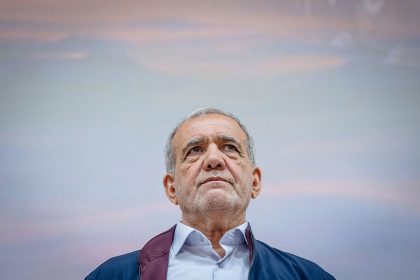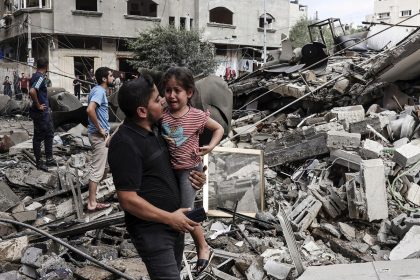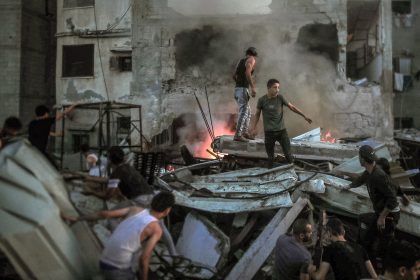It has been a tumultuous and restive week in Iran. The country has been gripped by consternation, and social media were inundated with angry reactions to yet another execution ordered by the judiciary. This time, the convict was Navid Afkari, a 27-year-old wrestler in the southwestern city of Shiraz who was charged with murdering a security guard during the 2018 protests in Iran against economic hardships and inflation.
Pleas by global public figures such as celebrated artists, athletes and academicians, as well as international organizations, human-rights advocacy groups, sporting bodies and governments, to secure clemency for Afkari recast his case as a high-profile affair, grabbing the headlines of international media, and becoming a serious talking point among Iranians at home and abroad.
Death sentences are not a novelty in Iran; however, this time, the fact that the defendant was a wrestling champion who had incidentally taken part in anti-government protests had garnered a lot of sympathy for him, and many of those who advocated his freedom ignored his alleged role in a murder case, even going the extra mile to call him a political prisoner, while he actually had no background in political activism.
American wrestler and Olympic medal winner Brandon Slay, German Greco-Roman wrestler and world champion Frank Stäbler, US women’s wrestling champion Sally Roberts, Indian wrestling star Bajrang Punia, retired Australian soccer player Craig Foster and Canadian weightlifting Olympic champion Christine Girard were only some of the renowned athletes and luminaries who campaigned to spare the young Iranian wrestler’s life.
Even US President Donald Trump, who has displayed unmatched bellicosity toward the Iranian leadership during his tenure, courteously pleaded with authorities in Tehran to save Navid Afkari’s life and not execute him.
Sadly though, the hanging of Afkari is a fait accompli, as on September 12 judiciary officials informed his family that he had been executed in Adel Abad prison in his home city of Shiraz.
It is a daunting task to comment on the circumstances surrounding the young Iranian wrestler’s detention, his indictment and the course of events leading to his execution, considering the highly sensationalized, emotive climate generated by his trial and final fate.
On social media, he was eulogized as a hero, hashtags went viral that “his path will be remembered,” Reza Pahlavi, the son of Iran’s deposed Shah Mohammad Reza Pahlavi, called his execution a “murder,” and some Iranian media based overseas went so far as naming him a “martyr of freedom.”
Indisputably, these descriptions sound rather exaggerated. To put it bluntly, to qualify as a “freedom hero” and “martyr,” some sort of accomplishment and social impact is required, but the young wrestler was simply one of thousands of Iranians who had taken to the streets to protest their worsening living conditions and government mismanagement.
Therefore, sentimentalizing his story, however heart-wrenching, will only eclipse a sober and objective overview of what he did and lived through.
Yet there are important questions about the legal proceedings and Afkari’s ultimate execution that need to be answered, and the different branches of Iranian government should live up to their obligations in calming the communal rage of a nation that is now only demanding accountability.
A fair trial?
Navid Afkari claimed in audio files he clandestinely recorded in prison, circulated on Persian-language media days before his execution, that he was tortured while in custody and forced into making false confessions and admitting responsibility for the killing of Hassan Turkman, a security guard for a water-supply company in Shiraz, during the 2018 protests.
The judge presiding over his case refused to consider his claims of having been tortured on several occasions at the hands of prison guards and soldiers.
Amnesty International has reported that he was denied access to a lawyer and other fair-trial guarantees. The advocacy organization also said the court brushed off his appeals to the judge to bring another detainee who had witnessed his torture to testify to the physical and mental harassment he had been subjected to.
His execution also took place under questionable circumstances. CNN reported that a group of philanthropists in Shiraz had been raising money to appease the family of the victim Afkari is believed to have killed and pay them restitution, in return for which they would pardon him, thus annulling the death penalty.
Mehdi Mahmoudian, a civil-rights activist, tweeted that he had been on a plane from the capital Tehran along with Navid’s brother bound for Shiraz, where they were going to meet with Turkman’s family and win their consent to pardon the young wrestler. Only “a minute” prior to the plane’s departure, the brother received a call, informing him that Navid had been executed.
Moreover, in accordance with Iranian law, a convict condemned to death should have the chance to meet his family for the last time before the execution is carried out, and his lawyers should also be notified of the decision 48 hours beforehand. In the case of Navid Afkari, these conditions were not met.
And when the authorities handed over Navid’s body to his family, signs of severe bruises reportedly could be seen on his face, giving rise to speculations that he might have died under torture.
Many Iranians have been asking why the judicial authorities were in such a hurry to carry out the execution and did not give a chance for negotiations with the family of the victim to proceed. UN human-rights experts termed this case a “summary execution” that sends a disturbing message to protesters.
Moreover, many Iranians have been challenging the fairness of the trial procedure and deploring the torture allegations.
Thus far, no compelling answer has been given to these inquiries.
The best response
Over these turbulent days as the execution of Navid Afkari has been capturing global attention, many advocacy organizations, sports bodies and individuals have been calling on the International Olympic Committee (IOC), which itself lamented the execution of the Iranian wrestler in a statement, and the world soccer governing body FIFA, to ban Iranian athletes and national teams from international events, including the upcoming Summer Olympics in Tokyo, to warn the Iranian authorities that their policies have consequences.
The former vice-president of the International Football Federation, Prince Ali bin Hussein of Jordan, has urged that Iran should be banned “from any international competitions until they adhere to basic human rights.” Brendan Schwab, executive director of the World Players Association, has also suggested that Iran should be denied participation in the Olympics.
Global Athlete, an international athletic advocacy organization, has made a similar demand, calling on the IOC to expel Iran from the Olympic Games and sanction Iran’s sports.
But let’s be realistic. Iran’s sports community did not have any role in what happened to Afkari, and calling for a ban is outlandish. Iranian athletes, from budding amateurs to professionals competing in international events, are young and aspiring talents who wish to make progress in their fields, and view international arenas as opportunities for showcasing their capabilities and reaping the benefits of their efforts.
Many of them struggle with acute economic hardships and do not have a stable income, and many train while grappling with a debilitating lack of proper equipment and facilities.
Will expunging Iranian athletes from international events really have a bearing on the twists and turns of Iran’s judicial regime?
The bottom line is, Iran should be encouraged by the international community to ameliorate its human-rights record, and incentivizing the Islamic Republic to join, uphold and practice the terms of international human-rights treaties and covenants to which it is not a party, including the United Nations Convention against Torture, and those to which it subscribes, is the first step.
The European Union has long been involved in talks with Iran, encouraging it to revisit its human-rights policies. This collaboration should be bolstered, as experience has shown that efforts to insulate Iran or singling it out for its human-rights infringements, while countries in its neighborhood like Saudi Arabia and Bahrain, owing to their Western nexus, never get reprimanded for their atrocities, will simply backfire.
It might even be the case that Iran’s rush to execute Navid Afkari was an attempt to exert its sovereignty and defy international pressures, putting the Islamic Republic in a catch-22 situation of making a bold decision to show it does not cave in in the face of foreign intervention or backing away and admitting publicly that its judiciary is susceptible to passing erroneous judgments.
Iran is not the only country that practices capital punishment. But it is certainly one of the most prolific executioners in the world. This is more troubling to know when considered against the backdrop of social fissures these executions create, particularly when the crimes associated with them have political undertones.
After Navid Afkari’s execution, the proponents and opponents of the death penalty have been fiercely clashing with each other on social media in recent days. Also, this verdict has become a battleground for the sympathizers of the Iranian government and its detractors to fight each other online and on the streets. This is simply counterproductive.
Navid Afkari’s death sentence was certainly one of the most divisive and polarizing in recent years in Iran. It should not be difficult for Iranian authorities to demonstrate some prudence in matters that involve the sensitivities of millions of people and refuse to ride roughshod over their citizens. They should wake up to the reality that injudicious decisions give ammunition to their enemies.
Kourosh Ziabari is a journalist based in Iran. He is the recipient of a Chevening Award from the UK’s Foreign and Commonwealth Office. He is also an American Middle Eastern Network for Dialogue at Stanford (AMENDS) Fellow.













